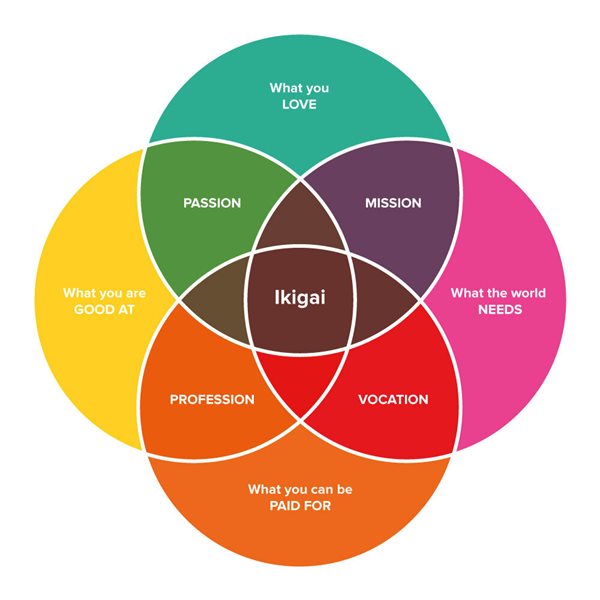Motivation is a top priority for organizations looking to maintain an engaged and eager workforce. And in a time of immense global uncertainty, it pays to pause and reflect on your life and what’s important to you. There’s never been a better time to consider your personal ikigai.
What is ikigai?
Ikigai can be translated as “reason (gai) for being (iki) ” – essentially, what is the source of your daily motivation?
Ikigai can be adopted as a practical philosophy for life, a way to find strength in tough times, and even as a long-term career planner. It can give value to mundane, humdrum activities, while also helping you to identify what it is that you truly value. So, how can you find your ikigai?
The four elements of ikigai
A Venn diagram of ‘the four elements’ of ikigai has blazed a trail through office cubicles, boardrooms, and HR presentations in recent years.
This way of applying ikigai was popularized by Albert Liebermann and Hector Garcia in their book Ikigai: The Japanese Secret to a Long and Happy Life.[1]

The diagram shows ikigai as the convergence of four areas of life: what you love, what you’re good at, what the world needs, and what you can be paid for.
The very center, where each area overlaps, is your ikigai – your reason for getting up in the morning and where you should focus your efforts to find ultimate fulfilment. Whether you’re a janitor, journalist or Jeff Bezos, if you find your ikigai, you’ll find pleasure and value in what you do.
The five pillars of ikigai
Beyond your career, ikigai can also become a framework for approaching life in general. Tokyo-based neuroscientist and author Ken Mogi [2] identifies the five central pillars of ikigai as:
- Starting small
- Releasing yourself
- Harmony and sustainability
- The joy of little things
- Being in the here and now
Much like mindfulness, the key is to be present in the moment and to not get caught up in your thoughts. At the same time, it’s unmistakably about looking forward and savoring special moments when they arrive.
Where Buddhism teaches you to shed the things you crave to find freedom and peace, ikigai is more generous. It teaches us simply to appreciate and consciously enjoy things once we have them. And those things can be small – the anticipation of a decent cup of coffee, your lunchtime run, or tending to your windowsill pot plants.
How to discover your ikigai
Ikigai and your career
Taking the cue from the four elements diagram, seeking your ikigai is akin to finding your perfect, dream job. Imagine combining what you love, what you’re good at, what the world needs, and – the kicker – what you can get paid for. Is it even possible?
Finding your calling
This might seem especially difficult if, like many people, you haven’t got a clue what you want for dinner, let alone what your ultimate calling in life is.
We’ve all heard stories of dramatic career changes in pursuit of dreams. Like ditching the nine-to-five to become a ski instructor, or quitting a high-powered corporate role to retrain as a midwife.
But it doesn’t have to be so drastic.
Consider which types of tasks give you the most pleasure in your current job:
- Do you enjoy managing people or working in isolation on technical tasks?
- Do you get satisfaction from solving complex issues or giving presentations and chairing interviews?
- Do you like directly managing stakeholders or prefer to get stuck into a spreadsheet?
By slowly sifting out the aspects of your work you don’t enjoy, and increasing what you do, you can start to gain a sense of your ikigai.
Saving the world
But does this cover the trickiest aspect to ascertain: is what you do something the world needs?
This selfless, giving aspect of ikigai traditionally manifests as giving yourself over to something other than yourself. This isn’t perhaps as difficult as it first appears.
You don’t need to quit your job to go retrain as a vet or start a charity. Remember that the first pillar of ikigai teaches us to “start small.” Giving yourself over to something else can be as simple as offering to buy your elderly neighbor some groceries, taking a day out to volunteer, or providing apprenticeships to underprivileged community members.
Small moments and gestures of kindness can have a dramatic impact on how you feel about the other areas of your life, especially when you’re struggling to find motivation.
Many organizations already engage with the third pillar of ikigai (“harmony and sustainability”) by adopting a “triple bottom line” [3] – placing profit alongside the impact on the planet and people as a measure of success.
This approach to social responsibility can provide a greater sense of purpose that has a subtle, but powerful, effect on how we relate to our work. Especially on a dreary Monday morning.
Finding flow
You might think that finding your ultimate calling is all well and good, but right now you’re struggling to feel engaged in your job. Ikigai, as a way of life, doesn’t just have to be about finding your mission: it can help you today – right now!
Japanese scientist, Ken Mogi, vouches for pleasure through absorption in an activity. Work can become an end in itself – not something to endure to get something else, like a promotion or bonus.
Mogi uses Mihaly Csikszentmihalyi’s concept of being “in flow” [4] to show how getting lost in even the dreariest of tasks can bring a sense of reward and freedom. (This is related to the pillars “releasing yourself” and “being in the here and now”). With the satisfaction that comes from being “in the flow,” even the most dreaded task can become, not just bearable, but rewarding.
Looking forward
Ikigai isn’t only about powering forward in your career, it can have a powerful effect on your motivation and focus every day.
By combining the career-honing powers of the Venn diagram with the more foundational five pillars, you can start to build up to something new, while making the most out your current situation – seeing you through both the bad times and the good.
References
[1] Albert Liebermann and Hector Garcia, Ikigai: The Japanese Secret to a Long and Happy Life (Hutchinson, 2016).
[2] Ken Mogi, The Little Book of Ikigai: The Essential Japanese Way to Finding Your Purpose in Life (Quercus, 2017)
[3] ‘Triple bottom line’. Available at: https://www.economist.com/news/2009/11/17/triplebottom-line (accessed 8 June 2023).
[4] Mihaly Csikszentmihalyi, Flow: The Psychology of Happiness (Rider, 2002)



